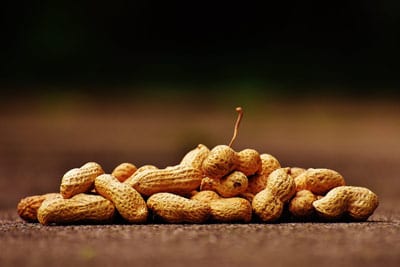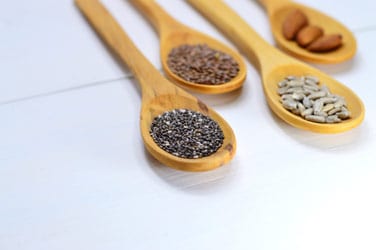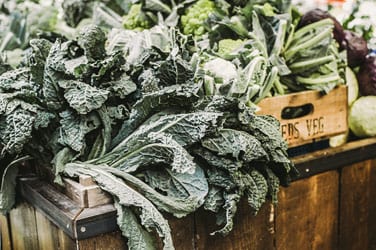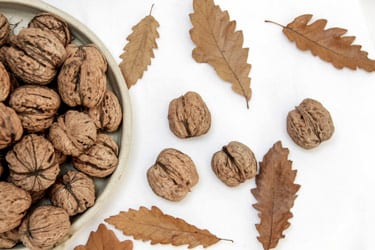Here’s our list of favorite nuts, ranked by their nutrient density. These varieties contain the most protein, fiber, B-vitamins, calcium, minerals, and vitamin E for the least amount of saturated fat: Almonds Filberts (hazelnuts) Peanuts Chestnuts Pistachios Walnuts Cashews Pecans Macadamias Almonds. Our “Top Nut” award goes to the almond. Here are the main nutrients […]
- Home
- Topics (Page 70)
Peanut Butter Basics

Praise for Peanut Butter! Could life go on without peanut butter? Yes, but not as pleasurably. Not only is peanut butter a nutrient-dense food, it is one that most children enjoy. Parents like its convenience. Two tablespoons of peanut butter, the usual amount for filling a peanut butter and jelly sandwich contains: • 8.5 grams […]
Other Nut Butters

Peanut butter isn’t the only kind of nutbutter you can spread on your whole-wheat bread. Try some variety. • Almond butter is more nutrient-dense than peanut butter. It contains half the amount of saturated fat, less salt (usually), and eight times as much calcium. Peanut butter, however, contains twice as much protein and four times […]
Top Seeds

Seeds have nutritional profiles similar to nuts, because, after all, nuts are seeds. One ounce of hulled sunflower seeds (one medium-size handful) offers: • 165 calories • 5.5 grams of protein • 14 grams of fat (90 percent saturated) • 3 grams of fiber • 2 milligrams of niacin (10 percent of the DV) • […]
Why do You Need Iron?
Iron is necessary to make hemoglobin, the substance that carries oxygen through your blood to all the cells in your body. Hemoglobin is what makes red blood cells red. With insufficient iron, and therefore not enough hemoglobin, red blood cells become small and pale and don’t carry enough oxygen. You may have heard the phrase […]
How Much Iron do You Need?
Children, 1-10 years 10 mg. Teen males 12 mg. Adults males 10 mg. Teen and adult females 18 mg. Pregnant women 30 mg. * Average RDA for iron Babies store iron from their mother’s blood while they are in the womb. Babies born prematurely need extra iron because they do not have enough time in […]
Why Do Babies Especially need More Iron?
It is very important for growing infants to get enough iron in their diet. Infants between one and two years of age who have iron deficiency anemia have been found to have lower scores on mental and motor functioning tests; their scores are also lower at five years of age. The late Frank Oski, who […]
Why do Women Need More Iron?
An active, menstruating woman should eat at least eighteen milligrams of iron daily. This is easier advised than done. A well-balanced diet supplies around six milligrams of iron for every thousand calories. Yet, women usually eat about 2,000 calories, which amounts to around twelve milligrams of iron a day. Add to this diminished iron intake […]
How Can I Tell if My Children or I are Low in Iron or Anemic?
If you suspect anemia, look for these signs: Paleness (especially noticeable in the face and earlobes of infants and children; in the palms and nail beds of adults) Weakness Fatigue Shortness of breath Irritability Difficulty concentrating Increased susceptibility to infections Intolerance of cold temperatures Constipation Brittle, flat, thin fingernails
3 Steps to Correct Your Child’s Anemia
“Borderline” anemia can usually be corrected just by increasing your dietary supply of iron, without taking iron supplements. If your child is anemic, here’s how to restock the iron deficient body stores and elevate the hemoglobin level to normal: Step 1: Using diet to correct anemia in infants requires about one milligram of dietary iron […]
8 Ways to Prevent Anemia

Iron deficiency can cause anemia, a shortage of hemoglobin in the blood. This can lead to weakness, fatigue, a pale face and earlobes, and brittle, spoon-shaped nails. There are other causes of anemia besides nutritional deficiencies, including massive or chronic blood loss. The best way to tell if you have enough iron in your body […]
My Doctor Measured my Hemoglobin and it’s Normal. Could I still be anemic?
My Doctor Measured my Hemoglobin and it’s Normal. Could I still be anemic? A normal hemoglobin level does not necessarily indicate that you are not anemic, meaning your blood is not low in iron. Yet, the hemoglobin level obtained in your doctor’s office does not reflect total body stores of iron. It’s possible to have […]

